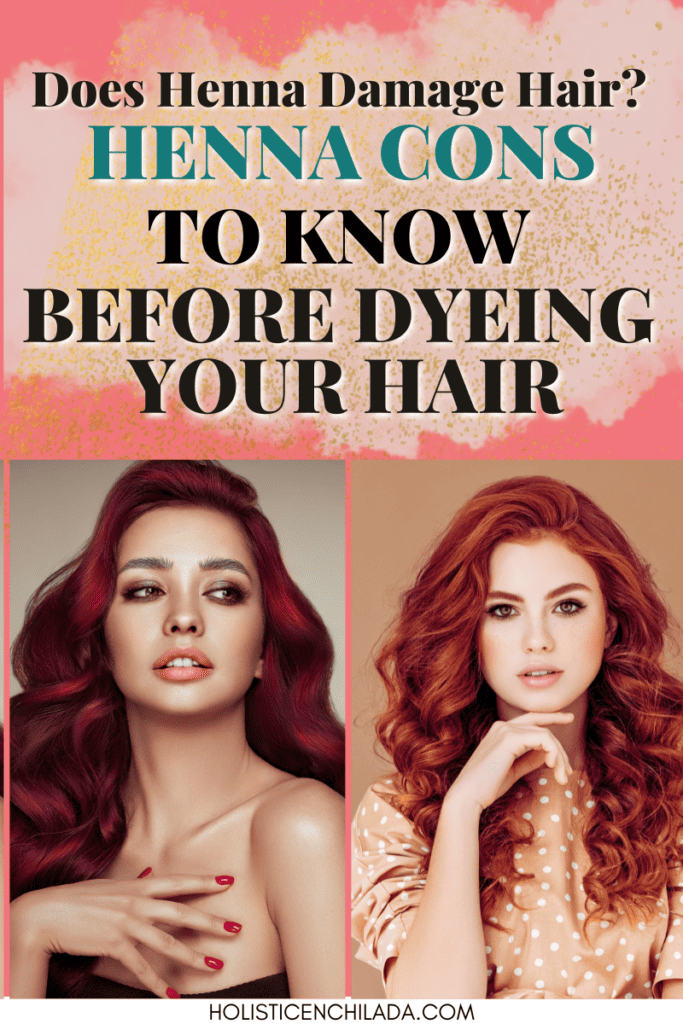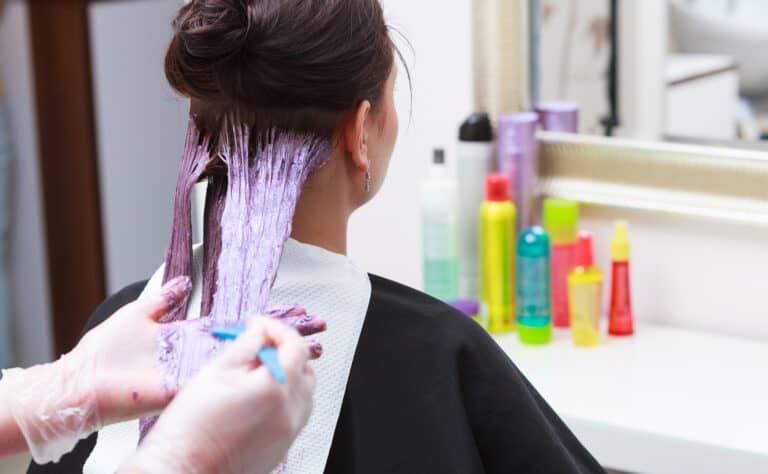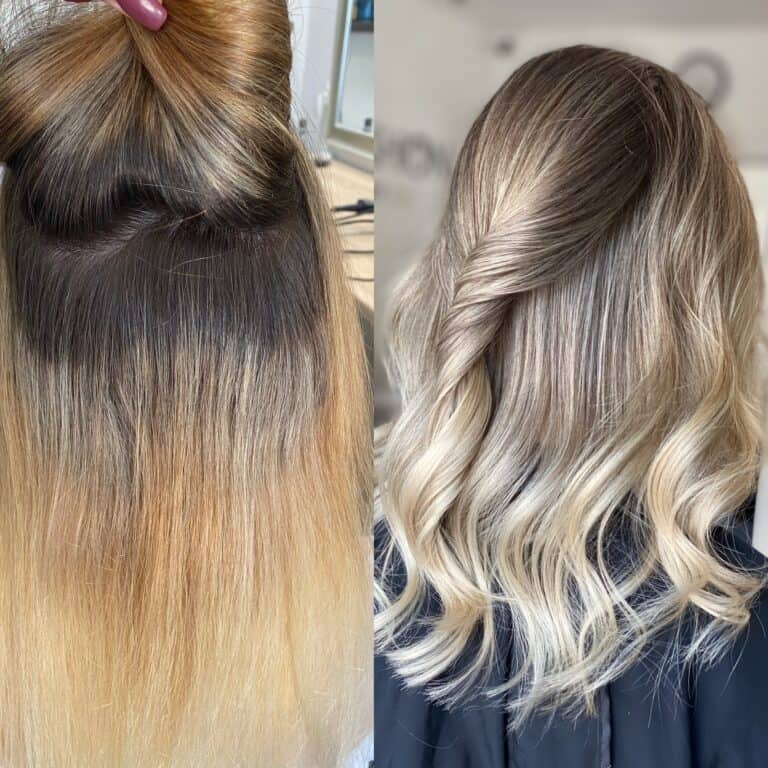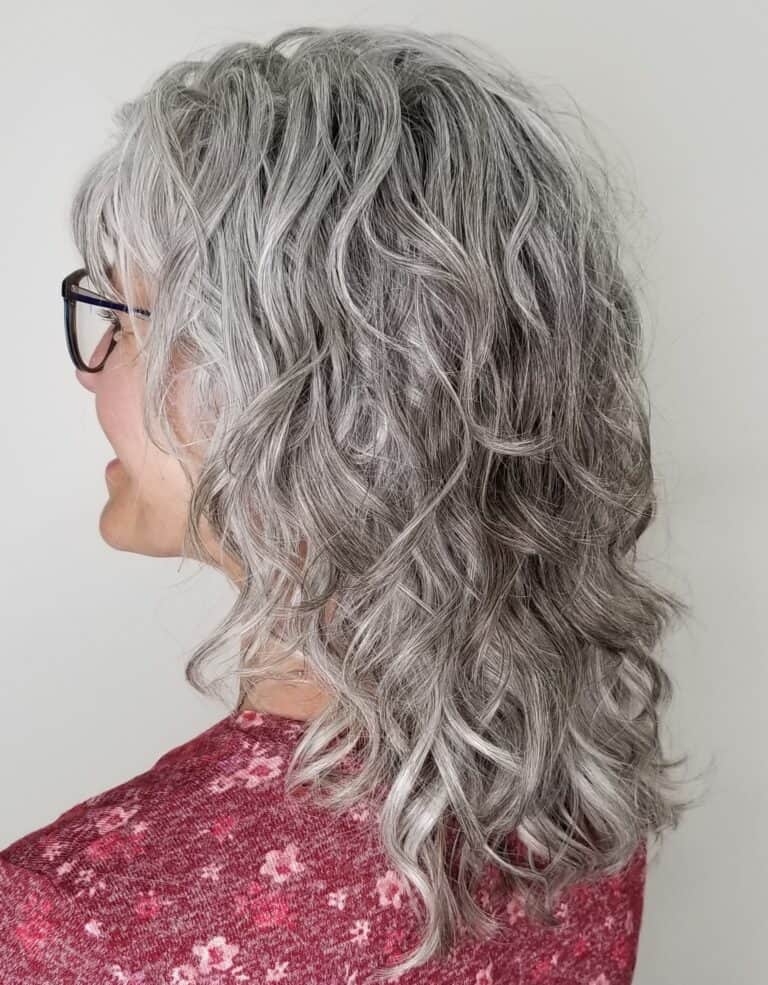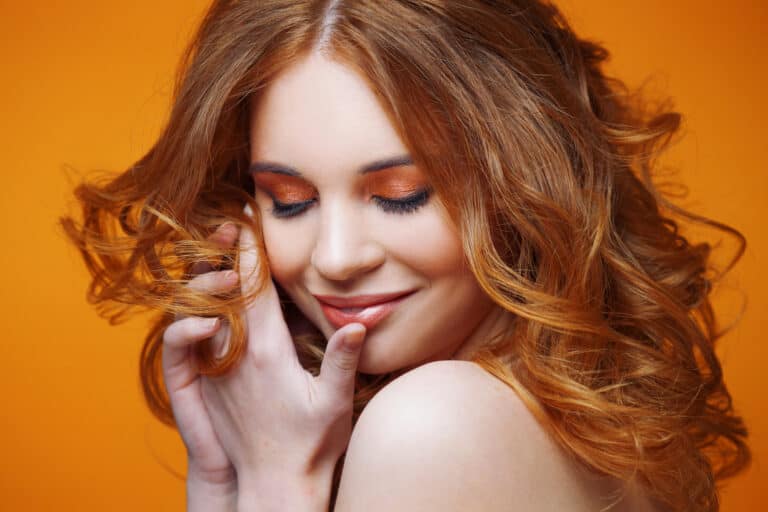Does Henna Damage Hair? Henna Cons to Know Before Dyeing Your Hair
This post may contain affiliate links, and I will earn a commission if you purchase through these links. Please read the disclosure policy for more details.
Pure henna is one of the oldest methods of coloring hair, and you might be tempted to try out this natural hair dye. But of course, as well as the many benefits, there are some downsides you need to bear in mind.
Many people love using henna hair dye, as it gives you shiny auburn hair that looks thicker and healthier. But is it really as good as people say?
There are some downsides to using henna hair dye, and it won’t be right for everyone. So in this guide, we’ll take a look at the pros and cons of henna, and share some tips for using henna so you can get the best possible results.
What Is Henna Hair Color?
Henna is a plant-based dye made by drying and powdering leaves from the henna plant (Lawsonia inermis). The powder is mixed into a thin paste with water, tea, or coffee to create a colorant that will stain hair, skin, and pretty much anything else it touches.
The lawsone molecules that make henna act as a colorant also give it antibacterial and antimicrobial properties.
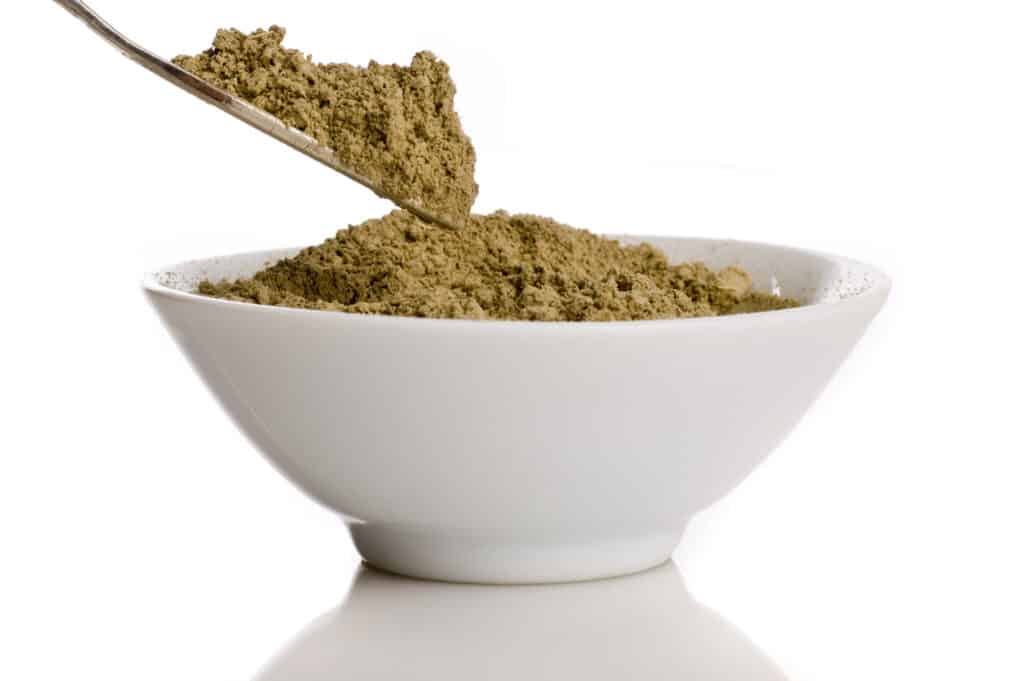
The Cultural Context of Dying Hair With Henna
For thousands of years, powdered henna plant leaves have been used to create body art all around the world, including North Africa, East Africa, the Middle East, and South Asia.
Henna is applied during Hindu weddings and religious festivals like Diwali, and South Asian Muslims apply a henna tattoo known as mehndi during weddings and religious festivals like Eid al-Fitr.
Considerations Before Using Henna for Hair Color
Before you start dying your hair with henna, here are some factors you need to consider.
Your Hair’s Color and Porosity
Henna hair dye gives different results for everyone, but it works best on dark hair with high porosity. If your natural color is light brown, the final result will be more noticeable and may not last as long.
Not sure if you have high porosity hair? Our guide to hair porosity will help you check.
If you have blonde hair, using natural henna hair dye could result in a bright orange tint. So be sure this is the result you want before you apply the dye.
Dryness Prevention
Henna can sometimes leave your hair feeling dry, but you can help this by adding a natural moisturizer like aloe vera or coconut oil to the henna mix before you apply it.
Duration and Frequency of Application
Leaving henna hair dye on for too long, or applying it too frequently, can cause the protein molecules to build up on your hair strands. This can make your hair feel heavy and weigh your curls down.
Product Quality
There are so many products on the market, and choosing a henna hair dye can be confusing. It’s best to stick to high-quality products with no harmful additives. If you don’t have a personal recommendation for a brand, try to buy henna that has great reviews online.
Potential Allergy Risks
Although they’re rare, henna allergies do happen occasionally. If you’ve used red henna, the symptoms are usually mild irritation, redness, or swelling.
However, some black henna contains PPD, which can cause chemical burns and severe allergic reactions, including breathing problems.
It’s always safest to check with a patch test 24 hours before you apply henna dye.
Post-Dyeing Aftercare
It’s essential to practice good aftercare when you’ve colored your hair with natural henna.
Rinse the henna out thoroughly and then leave your hair for 24-72 hours to let the color settle and oxidize. Afterward, you can shampoo and condition your hair with sulfate-free products and follow up with a hydrating hair mask for an extra moisture boost.
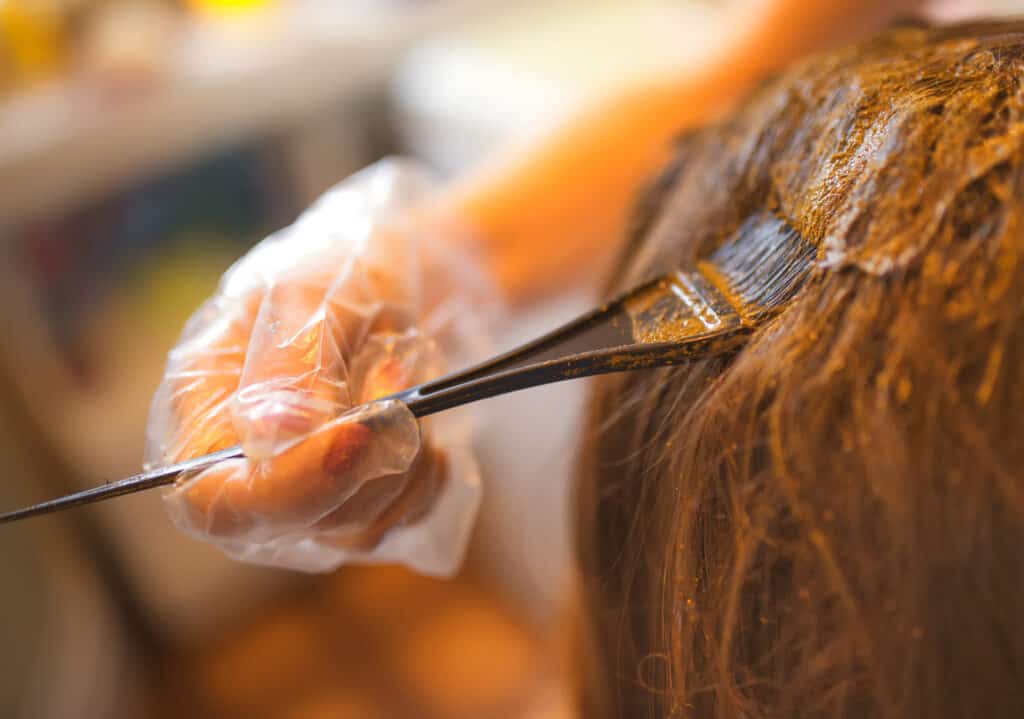
The Pros and Cons of Henna Hair Color
Like any other hair treatment, there are pros and cons of henna that you need to consider before you take the plunge. Let’s take a look at the advantages first:
Henna Pros
People have been using henna to dye hair for thousands of years, and with all of these benefits, it’s easy to see why!
All Natural Hair Dye
One of the main benefits of using henna hair dye is that it’s an all natural hair dye containing plant-based ingredients.
If you buy a good quality henna dye, it will contain no harsh chemicals, toxins, or preservatives, which is excellent news for anyone with a sensitive scalp or damaged hair.
And because there’s no ammonia or peroxide in henna, there’s less chance of a bad reaction.
Works Well on Early Grays
The reddish-brown color of natural henna is great for covering early gray hairs. However, the color becomes a bright orange on salt-and-pepper or predominantly silver hair, where a high-quality chemical dye would work better.
Hair Growth
The phenolics and tannins in henna can stimulate hair follicles and support healthy hair, while the high nutrient content will help to fuel new hair growth.
Repairs and Strengthens Hair
Henna is packed with nutrients like proteins, minerals, antioxidants, and vitamin E, which makes it a great way to boost hair health. And it binds to the hair follicle, helping to fill in any gaps in the cuticle, mend split ends, and make your hair stronger and healthier.
Removes Dandruff
As well as being rich in proteins and antioxidants, the natural properties of henna also give it an antifungal effect. This means that if you have an itchy scalp or dandruff, henna’s antimicrobial efficacy could help to improve your condition.
Long Lasting Color
If you love the color that henna gives you, the good news is that these auburn/red tones will last much longer than regular chemical dyes. That means you probably won’t need to dye your hair every 6-8 weeks.
In fact, if you have dark hair, you might only need to touch up the color once or twice a year.
Healthy Looking Hair
Henna is packed with vitamin E, which will help to make your hair feel softer. It also coats your hair, binding with the keratin in your hair follicles to fill gaps in the cuticle. This forms a barrier that protects against damage and reduces breakage.
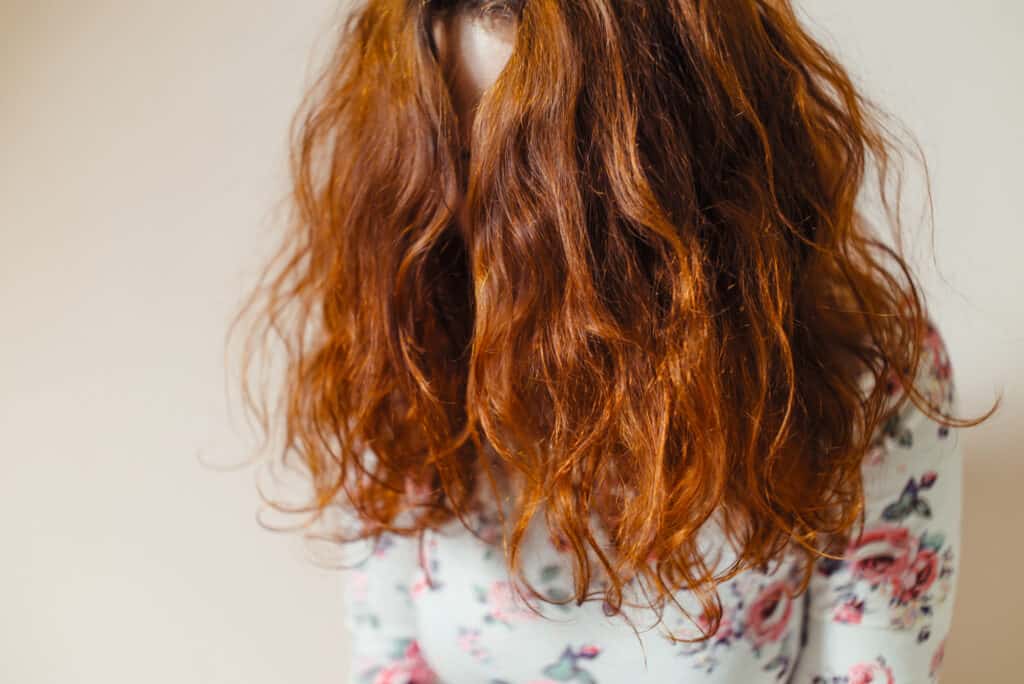
Henna Cons
Henna has some great benefits, but it isn’t ideal for everyone. Here are some of the disadvantages of henna for hair:
Messy and Time-Consuming Dying Process
Henna application is a messy task because the thin texture of the paste makes it easy to spill and splash. Applying henna evenly is also tricky, and poorly applied henna can give a blotchy finish to your color.
Then you have to leave henna on for much longer than box dyes. The minimum is at least three hours, but some people leave it on to develop overnight.
It’s best to apply henna in your bathroom, where you can clean up splashes more easily, and wear old clothes that you don’t mind getting stained.
Be sure to wear gloves when applying henna, and cover your hair with a shower cap or plastic wrap while the color develops.
Impossible to Remove or Change
Henna is a permanent dye that penetrates deep into your hair follicles. It also interacts with chemical dyes, causing uneven results or dry hair.
So if you don’t like your henna-dyed hair, it can be extremely difficult to change to a different shade. Bleaching it could result in a bright red-orange hue and leave your hair dry, brittle, and inelastic.
Generally, the only way to remove henna is to wait for the colored hair to grow out.
Stains Skin and Hairline
Henna hair dye will stain your skin and any clothes or surfaces it touches. This bright orange henna stain will be obvious on the skin around your hairline and on your scalp, and it’s not easy to cover up.
Potential Altering of Hair Chemistry (Curls)
Some people report that their natural curl pattern changed after they applied henna. This can depend on several factors, like your natural hair texture and how often you use henna dye.
In most cases, it seems like the henna paste weighs down the curls, and the effect is only temporary.
However, if you have wavy hair or loose curls and use henna frequently, you may see a change in your curl pattern.
May Create Dry Hair
Henna can have a drying effect on your hair, but you can counteract this by adding moisturizers to the paste. Rinsing your hair thoroughly will also help by removing any excess henna that is clinging to your strands.
Once you’ve let your color oxidize for 1-3 days, you can use a hydrating hair mask to revive your hair.
Can Only Darken Hair
Henna can’t lighten your hair, but you can use it to darken it. Henna works best on dark hair as it enhances the warm brown undertones, but if you use henna on blonde or gray hair, you will get more of an orange tone than a red/auburn color.
Beware that if your hair has previously been chemically colored, you will get uneven results. So it’s best to only use henna on virgin hair or to plan multiple applications for the best chance of an even finish.
Generally, henna can only give your hair a natural-looking deep red or auburn tint. You can try adding cassia for a lighter shade or indigo for a darker shade, but henna can’t be used to give your hair a bold red shade or any color other than red.
Strong Smell
Henna has a distinctive, earthy scent that lingers in your hair for days after using it. If it bothers you, you could try using a sulfate-free conditioner to mask the smell.
Risk of Side Effects
Coloring your hair with pure henna won’t cause hair loss, but using henna paste containing additives or applying it incorrectly can cause a dry scalp and hair. This may lead to hair loss.
Allergic reactions to henna are rare, and most involve mild skin irritation or allergic contact dermatitis. However, in severe cases, an allergic reaction to black henna can be extremely dangerous and involve chemical burns or life-threatening injuries.
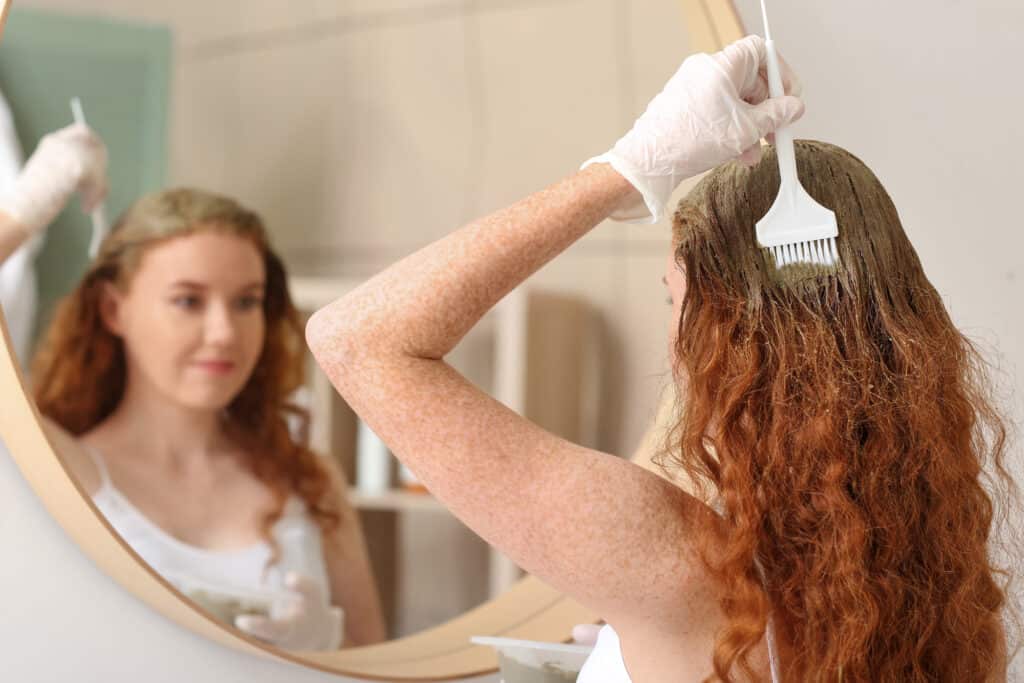
Tips for Using Henna Hair Color
How henna reacts with your hair depends on factors like hair porosity, the dye quality, and whether you add any conditioning agents.
Here are a few tips on getting the best results from applying henna dye:
Start With a Patch Test
Every time you color your hair, it’s essential to do a skin test and strand test 24 hours beforehand. The strand test will show how the dye will interact with your hair, and the patch test will help to rule out any allergic reaction.
Avoid Black Henna
Although it’s pretty rare, some people do have allergic reactions to henna. This is particularly true with black henna products, as some contain PDD (paraphenylenediamine).
Using low quality black henna to color your hair or for a black henna tattoo can cause severe allergic reactions, including redness, swelling, burning, and skin blisters.
Unless you are sure the product you buy doesn’t contain PDD, it’s safer to stick to red henna.
Avoid a Reaction with Metal
Most natural henna dyes won’t react with metal containers, but it isn’t easy to know for sure. Some types of henna will oxidize metal bowls, leaving stains or tarnishing. Mixing your henna dye in a plastic, glass, or ceramic bowl is the easiest way to avoid this problem.
Be Cautious With Ready-Made Henna Paste
There are lots of henna powders and ready-mixed henna pastes available, so be sure to choose a high-quality product.
Some manufacturers may add chemicals to reduce production costs, and it’s important to buy a product free from additives, pesticides, and PDD. Some low quality henna powders and pastes contain dangerous chemicals that can cause allergic reactions. These include:
- Carmine
- Chromium
- Disperse Orange dye
- Pyrogallol
- Silver Nitrate
You should always buy pure henna and check to ensure your product doesn’t contain any of these ingredients.
Leave Your Hair Alone for 24 Hours After Rinsing
Once you’ve thoroughly rinsed your hair, it’s important to leave it alone for at least 24 hours, preferably three days or even longer, to let the henna oxidize. Then you can shampoo and condition your hair as usual and maybe use a moisturizing mask to boost hydration.
FAQs
Just in case we haven’t covered all of your queries, here are are few of the questions we get asked most frequently:
Does Henna Damage Your Hair?
Henna won’t damage your hair if you choose a good quality natural henna and apply it according to the instructions. It’s a completely natural dye, free from any harmful chemicals, and contains nutrients that can even help to improve your hair’s health.
Who Is Henna Good For?
Henna is great if you prefer to use natural products, want to dye your hair auburn-red, and feel confident that you won’t want to change your hair color too soon.
Will Henna Thicken Your Hair?
Because henna coats the hair shaft, it can make your hair look thicker and more voluminous. It can also help to make it look shinier and reduce flyaways.
Final Thoughts – Is Henna Good for Your Hair?
Overall, the pros of using henna outweigh the cons. It is safe, long-lasting, and has other benefits, like being packed with hair-friendly nutrients. It can also leave your hair shiny and more voluminous.
But, as with any color treatment, buying high-quality henna and doing a skin test to rule out allergic reactions is essential. You also need to be confident that you’ll be happy with the color, as removing henna from your hair is almost impossible.
Henna hair color is a commitment, so consider all the advantages and disadvantages before you take the plunge!
Want to remember this? Save Does Henna Damage Hair? Henna Cons to Know Before Dyeing Your Hair to your favorite Pinterest board!
